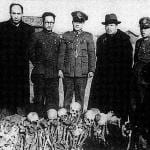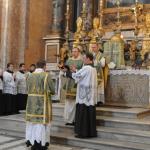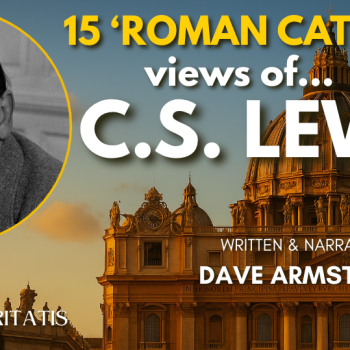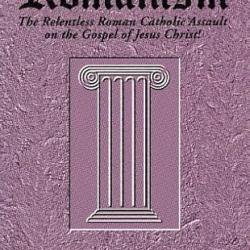Biographers and/or Friends Kreeft, Pearce, Derrick, and Possibly Tolkien Think This is Why Lewis Never Became a Catholic
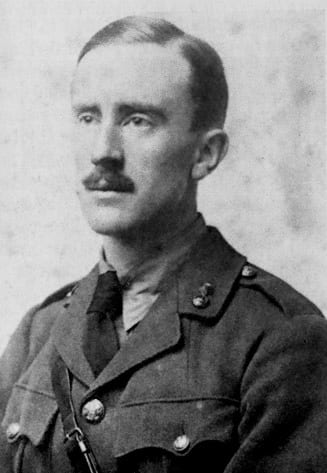
C. S. Lewis was raised in Belfast, and by his own frank admission to his good friend J. R. R. Tolkien, this had more than a little to do with his never “poping.”
I can’t really buy the “just couldn’t shake the residual childhood anti-Catholic bigotry” argument for why CSL never became Catholic. It’s psychologically tempting, especially for those of us who benefited so much from his wisdom on our journey into the Church. He saw so much, he was obviously much better read in the Tradition than us, he was also a man of prayer and clearly submitted to the Lord. It seems to call for some extraordinary explanation that he never came the whole way home. After all, how could it possibly be that I was graced to see farther than the great teacher?
But the Ulster argument fails, I think, on at least two grounds. First, I think it wrongs him. Let’s grant that his friendship with the Catholic Tolkien was old and based on other grounds. His long correspondence published as Letters to an American Lady was always respectful of her Catholicism, but it was hardly a relationship of equals and perhaps he was just being charitable and polite. But look again at his correspondence with Blessed Giovanni Calabria; where’s the bigotry there? or the dissimulation?
If the first ground is a notable absence of evidence (for his residual anti-Catholicism), the second ground could be called evidence from absence–absence that is of any developed ecclesiology in his entire body of writing. There is a lovely, if fleeting, reference to the Church across the ages in Screwtape. Then there is the (wholly inadequate and unbiblical) image of a great house with many equally serviceable rooms in the introduction to Mere Christianity.
Can you think of any others? It is a curious lacuna in such a relatively extensive ouevre. Add to that his strained and evasive responses (the only piece of really poor reasoning that I can recall from his adult pen) when H Lyman Stebbins confronted him directly with the claims of the Teaching Church, and I think a more plausible answer appears. Lewis never found the Church because he never looked for her; he was quite content (and to be fair, not entirely incompetent) to be his own Magisterium.
At the end of the day, I think we just have to admit that David Mills is right and Joseph Pearce is stretching the data. Lewis, sadly, remained a Protestant until November 22, 1963 (though I’ve no doubt whatever that he is a Catholic now).
This theory comes from Tolkien’s report of what Lewis said to him.
I do agree, though, that he had a very weak ecclesiology. Catholic author and talk show host Al Kresta has noted that his Mere Christianity was woefully deficient, insofar as it eliminated as basic what is essential to two of the three great divisions in Christianity: the Church. It presupposes Protestant relative ecclesiological minimalism.
I can accept a two-part theory of Lewis’ refusal to pope: a Belfast background and your theory. That seems quite plausible to me. But I can’t discount Tolkien (assuming that story is true): especially given his role in Lewis’ adoption of Christianity and their close friendship.
*
I heard it from the premier Catholic apologist and philosopher, Peter Kreeft (author of several books about Lewis: one / two / three / four / five / six) in an interview on Al Kresta‘s talk show. As I recall, Kreeft said that Tolkien asked Lewis why he wasn’t a Catholic, and Lewis replied (paraphrase from memory), “If you had grown up in Belfast, you would understand and wouldn’t ask me that question.”
If this is a true report, I think it is admirable of Lewis to so honestly admit his biases, and to acknowledge that they had a sort of irrational effect on his position: sort of like Aldous Huxley admitting with remarkable candidness, that he adopted some of his views merely for the sake of sexual freedom.
Tracking down some hard evidence on that incident would be a real find. I know I have seen snippets in Lewis that seem borderline bigoted where Catholicism is concerned, so it did seem plausible to me, but of course that is no proof of its accuracy in the first place.
Joseph Pearce, in his C. S. Lewis and the Catholic Church (Ignatius Press, 2003) takes a nuanced, moderate position on this:
. . . we will be doing him a grave injustice should we fall into the trap of translating Puritania’s importance into a presumed omnipotence. It is important but it is not that important.
In essence, although Puritania remained a powerful presence in Lewis’s life, it was by no means an all-powerful presence. It would be truer to say that Puritania cast a shadow across the length of his life. . . .
In summary, Lewis’s religious upbringing seems to have been characterized by an inherited anti-Catholicism, whether implicit or explicit, combined with a tepid low-church Anglicanism spiced with Presbyterianism. (pp. 3, 5)
In searching on this topic, I found a remark of my own from the Coming Home Network forum (where I was a moderator for three years):
I’m convinced Lewis would be a Catholic now if he were still alive. As it was, I heard a story from Peter Kreeft that Tolkien asked Lewis one day why he wasn’t yet a Catholic. Lewis reputedly said something to the effect of, “if you had grown up in Belfast, you would understand why.”
That’s about it, I think. The leap was simply too great and wasn’t “thinkable” for Lewis. But today, with all the nonsense in Anglicanism, I think it would be a very different story. He would have been an outcast in his own communion. He sort of was, anyway, because there were plenty of Anglican liberals, then, too.
Here’s some more. Kreeft states in a 2003 interview:
The fault is that that is the only subject Lewis didn’t want to talk about, even with his friends, much less in public — the differences between the churches, especially the differences between the Church of England and the Church of Rome. He addressed issues within his own church and demolished Modernism, which infected (and still infects) all the churches. But he refused to deal with 1517 (or 1054, for that matter.)
Why? Both Christopher Derrick, Lewis’s student [author of C. S. Lewis and the Church of Rome: Ignatius: 1981], and Joseph Pearce, Lewis’s biographer, give the same answer: he was born in Belfast and knew his prejudices sat deep.
But he [generally avoided this question] for two good reasons. This is true even if the above constitutes a bad reason. For we must take him at his word in Mere Christianity when he says that the reason why he does not address the issues between the churches are these: first, he is not a professional theologian but an amateur whose “expertise” is in the “basics.” Second, that he thought God wanted him to address the “basics” because most Christian writers were not doing so; they were fighting on the flanks while the center was going undefended.
He also made very clear, in the preface to Mere Christianity, that “mere Christianity” is not an alternative to any church, nor itself a church. It is like a hall, from which different specific doors lead out, and only beyond those doors, only in the concrete churches, is there food and fire and bed.
Thus, both authors who wrote books specifically devoted to Lewis and Catholicism, give credence to this theory, and a major Lewis scholar today, Peter Kreeft, concurs with it. All three men are or were Catholics (Derrick died in 2007). But I have not as yet found any additional confirming evidence of Tolkien saying what I heard Kreeft on Al Kresta’s radio show report him claiming about Lewis, Belfast anti-Catholicism, and Catholicism.
Dialogue on Why C. S. Lewis Didn’t “Pope” [9-1-15]
C. S. Lewis vs. St. Paul on Future Binding Church Authority [National Catholic Register, 1-22-17]
Why C. S. Lewis Never Became a Catholic [National Catholic Register, 3-5-17]
C. S. Lewis on Catholicism (Correspondence: 1934-1947) [9-13-19]


